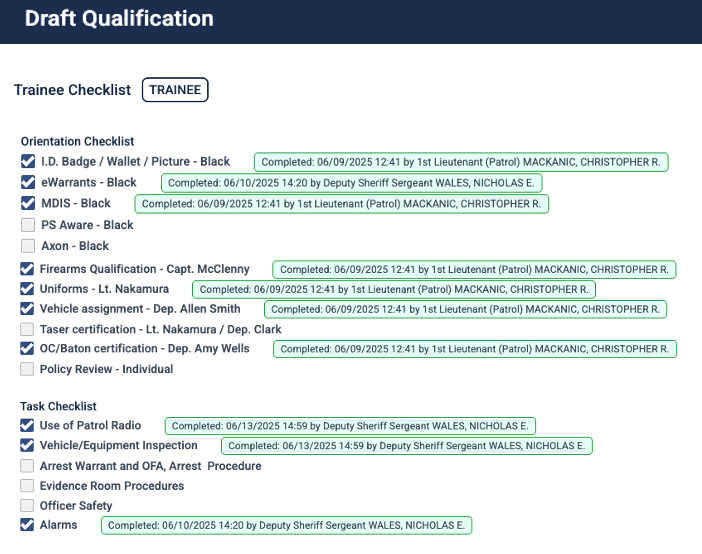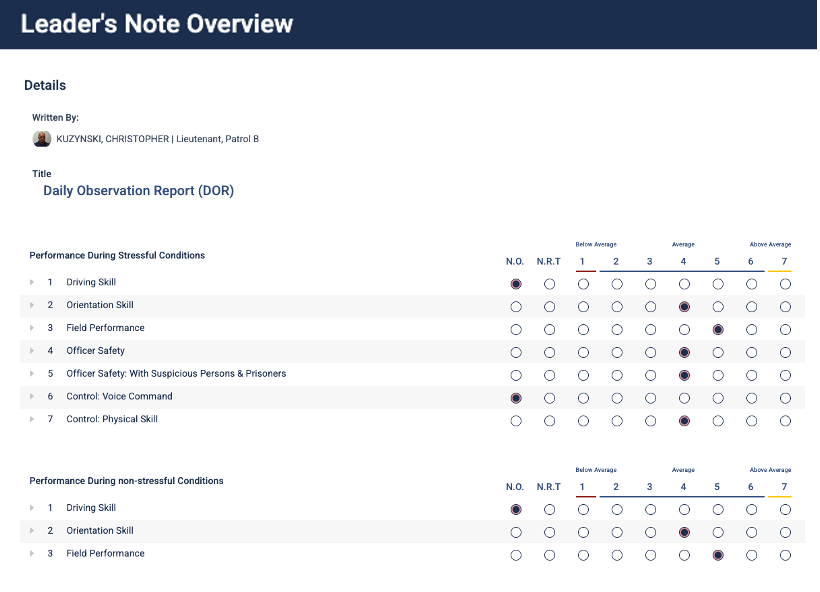Introduction
Across the country, law enforcement agencies are seeking smarter ways to train and evaluate new officers. At the Carteret County Sheriff’s Office (CCSO), outdated, paper-based documentation had become a challenge. It was slowing down communication, obscuring trainee progress, and consuming valuable time.
To modernize its approach, CCSO partnered with Essential Personnel (EP), a system that was designed with the needs of law enforcement in mind. They were able to digitize the field training program from end to end. The result? A streamlined, transparent process that better reflects the agency’s commitment to professionalism, accountability, and effective officer development.
The Challenge: Paperwork and Limited Visibility
Before moving to a digital solution, CCSO relied heavily on handwritten forms, physical folders, and manual approvals. With the immense documentation needed for field training, there is too much opportunity for things to be misplaced. And it’s difficult for command staff to get a clear view of a trainee’s overall performance.
“We used to spend too much time chasing paperwork and making sure the right people signed off,” said Major Derek Moore, Carteret County Sheriff’s Office. “Now, that’s all automated. Documents go where they need to, and nothing moves forward unless it’s complete.”
Digitizing the FTO process allowed the agency to transform how daily observation reports, phase evaluations, and skill checklists are completed and reviewed. Everything is stored in one centralized system. It’s clean, fast, and accessible.
Purpose Built for Law Enforcement
Essential Personnel offers tools that adapt to the needs of each agency. CCSO used EP to replicate and improve its existing FTO process, customizing documents and evaluation formats to reflect internal standards and training philosophies.
“There’s no one-size-fits-all,” Moore noted. “We worked with the EP team to make sure every report matched how we evaluate people here. It’s still our format, just improved.”
This flexibility allowed CCSO to modernize without abandoning what already worked.
Why Strong Field Training Programs Matter
Research has shown that strong field training is one of the most critical factors in shaping competent, ethical officers:
- A study published in the Journal of Police & Criminal Psychology (Dulin et al.) found that recruits are far more likely to apply academy teachings in the field when they are supported by structured, consistent FTOs.
- Research from the Russell Sage Foundation (Adger et al.) suggests that well-designed FTO programs can reduce the use of force and improve judgment under pressure.
- The National Academies emphasize that field training, not just classroom instruction, is essential for helping officers internalize policy, law, and ethical behavior in real-world contexts.
These findings support the CCSO’s decision to invest in a digital FTO program that promotes consistency, transparency, and meaningful mentorship.
Real-Time Tracking and Shared Progress
With EP’s Qualifications & Checklists feature, CCSO tracks trainee development in real time. FTOs can see which skills a deputy has completed and what remains. This shared visibility eliminates guesswork, especially when trainees rotate between trainers or shifts.
“If someone shows proficiency in radio communication on night shift, that FTO checks it off,” Moore explained. “The next FTO knows it’s been covered but can still reinforce it.”
This continuity was much harder to achieve with paper-based records. Now, each skill — whether it’s de-escalation, policy adherence, or report writing — is documented and time-stamped.

Daily Reports, Phase Summaries, and More

The agency fully digitized all core training documentation, including Daily Observation Reports (DORs), End-of-Phase Evaluations, and performance memos. Each document is linked to a trainee’s profile and accessible to trainers, supervisors, or command staff.
“That level of visibility helps us catch issues early or give praise when it’s due,” said Moore.
Administrative overhead has been dramatically reduced. There's no more compiling handwritten notes or chasing down sign-offs. Everything is compiled and review-ready.
The Digital Profile: A Long-Term Asset
One of the most impactful features for CCSO has been the Digital Profile. This dynamic record includes evaluations, notes, checklists, certifications, and performance history, all in one place.
“It follows that person through their entire training journey,” Moore said. “If we’re planning a promotion or looking at performance later, it’s already there...clean, clear, and secure.”
This profile doesn’t just support training. It contributes to long-term career development, performance reviews, and succession planning.
Measurable Impact
Since implementing Essential Personnel, CCSO has seen clear improvements in its training operations:
✅ Better communication between FTOs
✅ Real-time tracking of qualifications
✅ Custom forms that match agency standards
✅ Less paperwork, more time for coaching
✅ A consistent, audit-ready documentation process
“We’ve moved beyond just checking boxes,” said Moore. “We’re coaching, tracking, and growing our people in a way that’s consistent and effective. It’s made us better, and that means better for our community.”
Backed by Research, Designed for the Future
CCSO’s shift to a digital FTO program reflects broader academic findings: effective field training improves officer performance, accountability, and long-term resilience. As outlined by the Oxford Policing Journal, simulation-based learning and "learning by doing" are especially effective for helping officers develop decision-making, adaptability, and judgment.
Additional research from MDPI emphasizes that modern policing requires more than technical skill. Officers must also develop critical thinking, communication, and ethical reasoning — traits best reinforced through guided, real-world training.
By modernizing its FTO process with Essential Personnel, CCSO has aligned itself with the highest standards of officer development and future-readiness.
“It’s about preparing people to do the job the right way,” Moore said. “Essential Personnel helps us do that — with tools built for law enforcement by people who understand what we need.”


